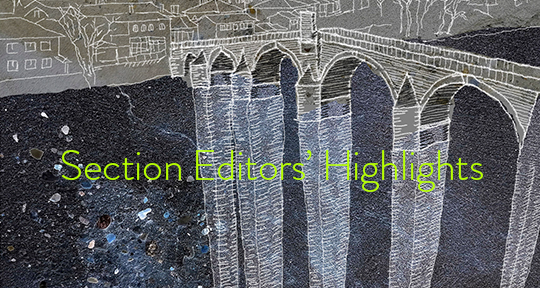As Asymptote celebrates the first issue of our second decade in world literature, we bring to you new work from thirty-five countries and twenty-four languages in our Summer 2021 issue! Drawing from the theme of our Special Feature, “Age of Division,” these varied writings speak to a moment of mounting borders, fractious politics, and heightened suspicion towards the other—but so too do they hint at the possibility of unexpected solidarities, strange encounters, and new geographies of affinity. Not sure where to begin with this bountiful issue? Let our blog editors take you through some of their favourite pieces to reveal a world that is, in the words of Lêdo Ivo, “sweet, full, pungent, and luminous.”
In the spring of 2004, an intifada singer in Ramallah said to his interviewer, “What I do on stage and what martyrs do on the streets are one and the same, just with different instruments.” Were resistance embodied in genre, the shape would undoubtedly be that of music. The art which “all art constantly aspires towards” for its certain coherence of form and content, this singular quality also speaks to its ability to move people passionately, crucially, to action. For music is a verb; it must be performed and enacted. It embodies, within its very idea, its eventual actualisation.
In the excerpt from Olivia Elias’s forthcoming poetry collection Your Name, Palestine, she makes a graceful address: “Musicians, a few minutes more.” Moving on to materialise the scene in sensual, wondering lines, she makes gentle work of speaking the terrible wreckage done to the country where she was born. Born in Haifa and living now in France, she is said to occupy a privileged space within the Palestinian diaspora as one of the few poets in French. In these poems, translated masterfully by Sarah Riggs and Jérémy Robert, she creates in her adopted language the continuation of the Palestinian nation, transcending geographical realities to rhyme with the poetics of Palestinian agency, with both singing and the witness of singing.
Musicians, I am speaking to you of a country
engulfed in a fault of history
of a people chosen to pay the price
of another sacrifice
of a story more than a hundred years old
full of sound and fury and blood
Intended for voices set to instruments, Elias’s work speaks to the intifada singers, the debke performances that conceptualise art from the violences of occupation, and the traditional melodies evoking the dignity of liberation. But without violence and ideology, the measured cadences of her lines are patient with painterly instinct. These poems draw their necessity from their stoic dreams of clarity. Palestine, untorn, in concert, singing.
In Mulugeta Alebachew’s “Heaven Without Prickly Pears,” writing similarly seeks physical qualities—the savoury texture of the language, the kinetic scan of the eye as it seeks and takes in. The topography of the Ethiopian town, Geneté, is overlaid with the infinite dimensions of the mind. Familiarities, kinships, intimacies run through in capillaries of psychogeography, drawing further on its composite, ramified history: “her mosaicked gum-tattoos of more than a dozen languages and myriad cultures.” With co-translator Bethlehem Attfield, Alebachew has done a wonderful job of rendering the original Amharic text, lush with dialect, into a fluent poetry that nevertheless beholds the precision of references outside of the English language.
This town bears my fondest memories, life vividly lived, and lessons well learned . . . my yesterdays, todays, and predictable tomorrows lay on its streets. . . My home includes the highway. My home does not exclude the other homes.
In this beautiful passage which eclipses the cautious private/public boundary, Alebachew speaks to the growing of the world. Just as in the acts of reading and writing, the dialectic division of outside and inside loses its binds, and one bleeds into the other. By bringing us into his Geneté, the subtle resentment of possessive being is defied; we are given interior knowing without it being our interior. In this world there is no space indifferent or vacant. It is all compounded in an infinite geometry of living; to inhabit a text that so generously navigates a place, it is an astonishing gift.
—Xiao Yue Shan
READ MORE…





